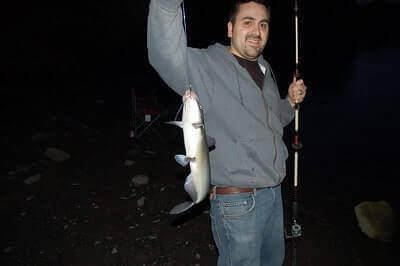Disclosure: We may earn commissions if you purchase products after clicking on a link from our site.
Would you like to catch more bullheads? Do you want to be more successful fishing for bullheads? Bullheads are abundant, tasty, and a favorite for anglers. Bullheads are one of the most popular “small” game fish in the United States. If you would like to learn how to catch more bullheads, then these bullhead fishing tips will help you take more bullheads home.
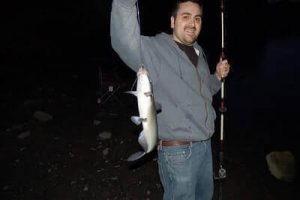
Table of Contents
How To Catch Bullheads
1. Casting
Casting is a versatile and effective fishing method for targeting bullheads, a species known for their bottom-dwelling behavior. Anglers typically employ lightweight fishing rods paired with spinning reels to cast baited hooks or artificial lures into areas where bullheads congregate, such as along the edges of weed beds, near submerged structures, or in shallow waters with muddy bottoms.
When casting for bullheads, anglers often use natural baits like worms, nightcrawlers, or cut bait, which are enticing to these omnivorous fish. By accurately casting their baited rigs to specific locations where bullheads are likely to be hiding, anglers can entice strikes and hook into these feisty freshwater fish.
Additionally, casting allows anglers to cover a wide area and explore different parts of the water body, increasing their chances of encountering bullheads and enjoying a successful fishing outing.
2. Night Fishing
Night fishing can be an effective method for targeting bullheads, especially during the warmer months when these nocturnal fish are most active. Anglers often rely on this approach to capitalize on bullheads’ feeding patterns, as they tend to become more active and aggressive under the cover of darkness.
Using specialized lights, such as lanterns or underwater lights, can attract insects and small prey fish, drawing bullheads to the illuminated area. Anglers typically employ baited rigs with natural baits like worms, nightcrawlers, or cut bait, which are highly effective at enticing bullheads in low-light conditions.
Patience and attentiveness are key during night fishing sessions, as bullheads may take their time to locate and consume the bait. With the right gear and techniques, night fishing can provide anglers with ample opportunities to hook into bullheads and enjoy a productive fishing experience under the stars.
3. Chumming
Chumming is a popular fishing technique used to attract bullheads to a specific area by dispersing a mixture of bait and other enticing substances into the water. Anglers often utilize a combination of grains, fish meal, fish scraps, and other aromatic ingredients to create a chum that appeals to bullheads’ keen sense of smell.
Once prepared, the chum is dispersed near the fishing spot, either by hand or using a chum dispenser, to create a feeding frenzy among the bullheads. This method not only attracts bullheads to the vicinity but also encourages them to remain in the area for an extended period, increasing the angler’s chances of success.
When employing chumming as a fishing technique for bullheads, it’s essential to monitor the amount and frequency of chumming to avoid overfeeding or scattering the fish too widely. With proper execution, chumming can be an effective strategy for enticing bullheads and maximizing catch rates during a fishing excursion.
4. Still Fishing
Still fishing is another fishing method used to catch bullheads. Still fishing is a traditional and effective method employed by anglers to target bullheads, a popular freshwater fish species. This technique involves casting a baited hook into the water and allowing it to remain motionless until a fish takes the bait.
Bullheads are typically found in slow-moving or stagnant waters such as ponds, lakes, and calm sections of rivers, making them prime targets for still fishing. Anglers often use a variety of natural baits such as worms, nightcrawlers, or bits of fish to entice these bottom-dwelling scavengers. Patience is key when employing still fishing for bullheads, as they tend to be cautious feeders, but with a bit of perseverance, anglers can be rewarded with a satisfying catch.
Bullhead Fishing Tackle
A light to medium action spinning rod with a 6 to 10-pound braided line will do the job for bullhead fishing. Some anglers also use a bait-casting fishing rod. A monofilament line can also be used in place of a braided one.
Types Of Bullheads
There are three types of bullheads. They are yellow bullhead, brown bullhead, and black bullhead.
1. Yellow Bullhead
Yellow bullhead, scientifically known as Ameiurus natalis, is a prominent member of the bullhead catfish family found in North America. Characterized by its distinctive yellow to olive-brown coloring with mottled patterns, the yellow bullhead inhabits various freshwater habitats such as lakes, ponds, rivers, and streams with slow-moving or still waters.
Unlike its close relatives, the yellow bullhead is recognized for its preference for warmer waters. With a robust appetite, it feeds primarily on aquatic invertebrates, small fish, and plant matter. Anglers often target yellow bullheads for their feisty nature and delectable flesh, making them a popular catch among freshwater fishing enthusiasts.
Additionally, their adaptability to diverse environments and resilience contribute to their prevalence in many water systems across North America, ensuring their status as a sought-after species for both recreational and commercial purposes.
2. Brown Bullhead
The brown bullhead, scientifically known as Ameiurus nebulosus, stands out as a notable member of the bullhead catfish family, native to North America. Renowned for its dark brown or olive-green coloring with distinctive mottled patterns, the brown bullhead thrives in a variety of freshwater environments including lakes, ponds, rivers, and streams with sluggish or still currents.
Characterized by its omnivorous diet, the brown bullhead feeds on a diverse array of prey such as insects, crustaceans, small fish, and plant matter. Anglers are drawn to the brown bullhead for its willingness to take the bait and its reputation as a hard-fighting adversary once hooked.
Additionally, its resilience and adaptability to varying water conditions contribute to its widespread distribution across North America, making it a sought-after species for both recreational and commercial fishing pursuits.
3. Black Bullhead
The black bullhead, scientifically known as Ameiurus melas, is a prominent member of the bullhead catfish family native to North America. Recognizable by its dark, almost black coloring, the black bullhead is distinguished from its relatives by its rounded anal fin and lack of distinctive barbels.
Thriving in a diverse range of freshwater habitats, including lakes, ponds, rivers, and streams with slow-moving or still waters, the black bullhead is known for its adaptability and resilience. Its omnivorous diet consists of various aquatic invertebrates, small fish, and plant matter.
Anglers are attracted to the black bullhead for its willingness to take the bait and its reputation as a vigorous fighter once hooked. Due to its widespread distribution and ability to thrive in various environmental conditions, the black bullhead holds significance both in recreational fishing and as a species of ecological importance in maintaining the balance of aquatic ecosystems.
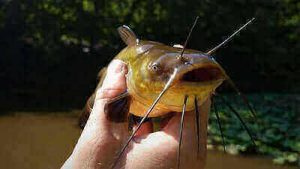
How To Catch Bullhead In A Pond
Bullheads don’t like to be in the sun and will hide themselves in the mud. When fishing for bullheads in a pond, look for structures that they use as cover. Look for fallen trees, logs, wrecks, weeds, grass mats, bridges, and docks when fishing for bullheads.
Look for bullheads deep in the water column or shallow areas that have a lot of cover. Bullheads will be around any structure that can shield them from sunlight. Additionally, you can fish for bullheads during the night when there is a full moon.
Bullheads are not ambush predators; they like to chase and hunt baitfish. When fishing for bullheads, look for areas that have baitfish such as shad, bluegill, minnows, or panfish. If you find these baitfish, you will be closer to finding bullheads as they hunt their food.
Use natural baits and use these baitfish as bait to catch bullheads in a pond. These are bullhead fishing tips that can greatly increase your chances of catching bullheads.
Bullhead Fishing Tips
1. Blueheads live along the bottoms of lakes, slow-moving streams, and quiet backwaters and travel in schools.
2. On a windy day, bobbers will lift the bait off the bottom and away from the bullhead. Therefore, bobbers are not the best choice for bullheads.
3. Use a 6-pound test line and small hooks for bullheads.
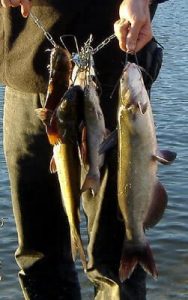
4. You can use nightcrawlers, angel worms, leeches, and minnows for bait.
5. When fishing for bullheads, fish near or on the bottom. Use a small sinker to take your bait to the bottom.
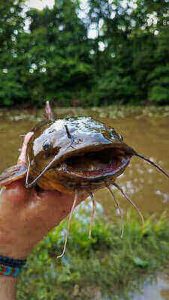
6. A light tackle with a 4- to 8-pound line will work for bullheads.
7. Hook sizes ranging from 4 to 1/0 will do the job when fishing for bullheads.
8. Use very sharp hooks with the points exposed. It will result in more hookups.
9. When you are fishing directly on the bottom without a float, always let the bullhead start moving away before you strike. Bullheads like to hold on to the bait, letting the angler reel them in, and then at the last second, they spit out the bait.
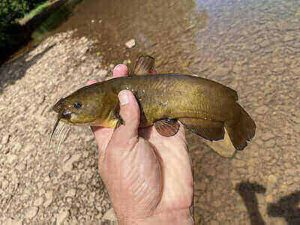
10. Always take many hooks on your bullhead fishing trips. Bullheads have a habit of swallowing hooks. It will be easier to retrieve the hook when you are cleaning the fish at home. You can also use small circle hooks that hook the bullhead in the corner of the mouth which can easily be removed.
11. Bullheads are more active at night when they feed. Fishing them at night can be very productive. Target the deep holes in creeks, backwater areas on rivers, weed bed edges, boat docks, humps, and long points.
12. If it is legal to use chum in your area, you can use it to attract bullheads.
13. Bullheads can’t resist a wiggly blown-up worm. Use a “worm blower” to inflate the worm with air. This lifts the worm up and makes it more visible to the bullheads. The sinker will rest at the bottom while the worms are wriggling high resulting in more strikes from the fish.
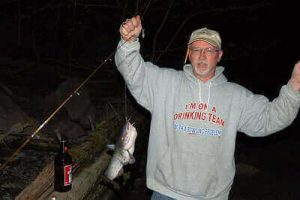
14. Soak your worms in pickled beet juice for some hours. This gives the worms a red color that makes them more attractive. Additionally, it toughens the worms which makes them harder to get them off the hook.
15. Bullheads have a very good sense of smell and taste. This ability works both in favor of the angler and against him. You can use the great sense of smell to your advantage by allowing the bullhead to find your scented bait. However, it can work against the angler if bullheads detect any amount of gas, oil, insect repellant, or sunscreen that made contact with the bait. Use latex gloves before working with the bait.
16. Bullheads will move away and hide when a shadow crosses the water. They conclude that the shadow is made by a predator that is close by. Anglers who fish in muddy waters don’t take this seriously as fish don’t see well in muddy waters. However, if you fish in clear water during the day, you will have a tough time catching bullheads when fishing beneath your boat.
17. Bullheads can also be caught in the winter. They will move to deeper water when the water temperature drops. Use a rig baited with chicken liver and drop it into the hole. Let it reach the bottom and then crank the reel handle so the bait is a foot above the bottom. This will attract bullheads.
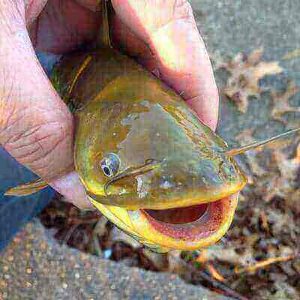
18. The best times to fish for bullheads are just before sunset and before sunrise. Low-light hours have proven to be the best conditions for bullhead fishing.
19. Bullheads like stationary water; therefore areas with water currents will not have bullheads. You can usually find bullheads in water that is less than 10 feet deep. On the hottest days, you can still find bullheads in shallow water as they can withstand warmer water temperatures and lower oxygen levels than other species of fish.
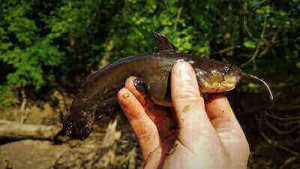
20. When bullhead fishing, you don’t have to constantly be moving the bait to entice a strike like with bass fishing or crappie fishing. Still fishing is the way to fish for bullheads.
21. Bullheads have very sharp pectoral and dorsal fin spines. Be careful when you handle bullheads. Always grip the bullhead around the pectoral spines and position your hand to avoid the dorsal spine. Always have a towel to use as a barrier between your hand and the bullhead.
22. Small bullheads will be found up to 10 feet in water supplied by storm drains. To fish for these small bullheads, cast as far into the drain as you possibly can.
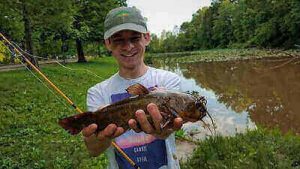
Live Bait For Bullheads
1. Nightcrawlers
Nightcrawlers serve as one of the most effective and widely used baits for targeting bullheads, a popular freshwater fish species. These large earthworms, typically found in moist soil during the night or after rainfall, possess a strong scent and enticing wriggling motion that attracts bullheads lurking along the bottom of ponds, lakes, and slow-moving rivers.
Anglers often present nightcrawlers by threading them onto a hook, allowing them to dangle enticingly in the water column. The natural movement and aroma emitted by nightcrawlers are irresistible to bullheads, prompting them to strike eagerly. This bait’s versatility and availability make it a preferred choice among anglers seeking a successful catch of bullheads, ensuring an enjoyable fishing experience.
2. Grasshoppers
Grasshoppers, though not as commonly used as nightcrawlers, can serve as effective bait for bullheads under the right circumstances. When these terrestrial insects inadvertently fall into the water or are strategically placed as bait by anglers, they become a tempting treat for bullheads inhabiting nearby freshwater habitats.
Bullheads, opportunistic feeders, are drawn to the erratic movements and natural appearance of grasshoppers as they float on the water’s surface or struggle near the bottom. Anglers often present grasshoppers on hooks either live or freshly deceased, allowing them to mimic the prey’s behavior and attract the attention of bullheads. While not as readily available as other baits, grasshoppers can yield success when targeting bullheads, providing anglers with an alternative option for a rewarding fishing experience.
3. Crickets
Crickets, with their lively movements and distinctive chirping, make for excellent bait when targeting bullheads. These small insects are particularly effective when fishing in areas where bullheads are known to feed near the water’s surface. Anglers often present crickets on hooks either live or freshly deceased, allowing them to float or sink naturally in the water, mimicking the movements of live prey.
Bullheads, known for their opportunistic feeding behavior, are quick to strike at the sight or vibration of cricket in the water, making them a preferred bait choice for many anglers. With their availability at bait shops and ease of use, crickets offer anglers another successful option when aiming to catch bullheads, ensuring an enjoyable and fruitful fishing outing.
4. Crayfish
Crayfish, with their distinct appearance and enticing scent, is a highly effective bait choice for targeting bullheads, particularly in areas where these freshwater fish are abundant. Anglers often present crayfish as bait by hooking them through the tail or securing them with a harness, allowing them to mimic the natural movements of live prey in the water.
Bullheads, opportunistic feeders with a voracious appetite, are irresistibly drawn to the sight and scent of crayfish, making them a prime target for anglers seeking a successful catch. Whether retrieved slowly along the bottom or suspended in the water column, crayfish serve as a reliable bait option, enticing bullheads to strike eagerly.
With their availability in many freshwater habitats and their proven effectiveness, crayfish remain a popular and rewarding bait choice for anglers pursuing bullheads, ensuring an exciting and productive fishing experience.
5. Minnows
Minnows, small fish typically used as live bait, are an excellent choice for anglers targeting bullheads, especially in larger bodies of water where these freshwater fish thrive. Presented on hooks either live or freshly deceased, minnows are incredibly enticing to bullheads due to their natural swimming movements and attractive scent.
Anglers may choose to fish with minnows by suspending them beneath a float or allowing them to swim freely near the bottom, mimicking the behavior of prey species. Bullheads, opportunistic feeders with a preference for live prey, are quick to strike at the sight of a minnow, making them a favored bait option among anglers seeking a successful catch.
With their availability at bait shops and versatility in presentation methods, minnows remain a reliable and effective bait choice for anglers pursuing bullheads, ensuring an exciting and rewarding fishing experience.
The Bottom Line
Bullheads are one of the most popular targets for anglers. They are abundant, easy to catch, and tasty. They will eat almost anything they come across. In this article, we share bullhead fishing tips acquired over a long career of bullhead fishing to help you take more home whether you are a beginner or an experienced angler.
Bank fishing tips will help you catch more fish from the shore if you fish from the banks of rivers, creeks, and ponds. Similarly, if you catch crappie, then this article about crappie fishing tips will help you become more successful in fishing for crappies.
